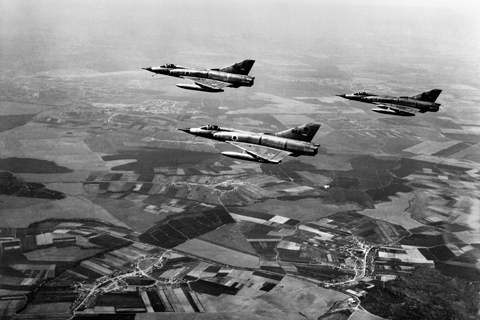 This file photo taken on June 5, 1967 shows Israeli air force Dassault Mirage III fighters flying over the Sinai peninsula at the Israeli-Egyptian border on the first day of the Six-Day Arab-Israeli war. – AFP
This file photo taken on June 5, 1967 shows Israeli air force Dassault Mirage III fighters flying over the Sinai peninsula at the Israeli-Egyptian border on the first day of the Six-Day Arab-Israeli war. – AFPJERUSALEM: The Arab-Israeli Six-Day War erupted early on Monday, June 5, 1967, a morning that saw heavy Israeli bombing of Egyptian air bases near Cairo and in the Suez desert. Within a few hours almost all Egyptian aircraft had been grounded. Israel essentially won the war on the first day by ensuring it had control of the skies.
The war erupts
At 7:24 am local time, a news flash from Tel Aviv says that Egyptian planes and tanks have attacked Israel. A few minutes later, an official statement speaks of heavy fighting in the south between Israeli and Egyptian forces following an invasion by the Egyptians and an Israeli counter-attack. Air raid sirens sound in Tel Aviv and alerts are triggered in other Israeli cities.
Most historians now believe that in fact, the Israeli air force opened the hostilities in crushing the Egyptian air bases. At 8:12 am, Egyptian radio interrupts its program to declare that "Israeli forces launched an assault on us this morning. They staged air raids on Cairo and our aircraft went after the enemy planes." Initially muffled explosions grow louder and sirens blare in the Egyptian capital.
Mobilization, state of emergency
Israeli army reservists are called up and trucks are commandeered, while armored vehicles move south, breaking through Egyptian lines, deep into the Sinai Peninsula. Civilian airports are shut down near Cairo and a nationwide state of emergency is then declared. Civil defense units are mobilized in Syria as Radio Damascus interrupts its broadcast to announce that Israel has attacked Egypt.
Syria, Jordan join the battle
Shortly after 10:00 am, Syria says its planes have begun to bomb Israeli positions. Jordan declares martial law and places its armed forces under Egyptian command before declaring war on Israel a few hours later. Iraq, Kuwait and Sudan follow suit, as do Algeria and Yemen, to be joined later by Saudi Arabia. In Jerusalem, street battles break out between the Israeli and Jordanian sectors, and fighting quickly spreads to Israel's borders with Jordan and Syria. Heavy fighting is reported early in the day on the Israeli-Jordanian front. Syrian planes hit the coastal towns of Haifa, while the Israelis target the Damascus airport with waves of attacks.
Global reaction
Both Egypt and Israel are sure of victory and in many Arab countries the mood is upbeat. Official statements never mention defeat. Elsewhere, global leaders are dismayed. Pope Paul VI asks that Jerusalem be declared an open city. The UN Security Council meets in emergency session and US president Lyndon B Johnson asks all sides to help him reach a ceasefire.
Israel captures Khan Younis
Israeli troops capture the Gaza border town of Khan Yunis and all the Egyptian and Palestinian forces in the sector, an AFP special correspondent reports late in the day. That protects Israel's western flank and its forces engaged with a large part of Egypt's army to the south, the report says.
Egyptian air force grounded
That night, Israeli prime minister Levi Eshkol tells the Knesset that all fighting is taking place in Egypt and on the Sinai Peninsula. He says serious damage has been done to the Egyptian, Jordanian and Syrian air forces. That is what determines the outcome of the Six-Day War. At midnight, Israel says it has decimated the Egyptian air force. Some 400 aircraft, including 300 Egyptian and 50 Syrian, were shot down from the first day. - AFP










